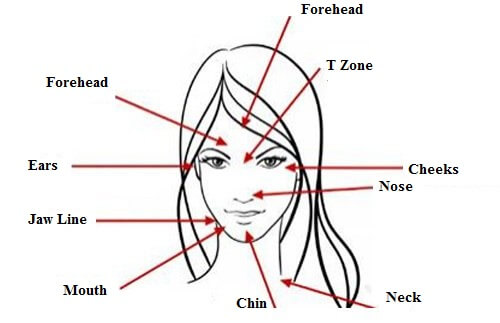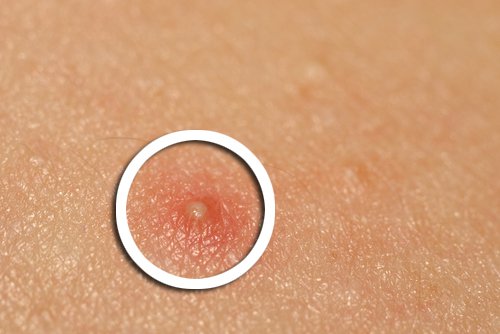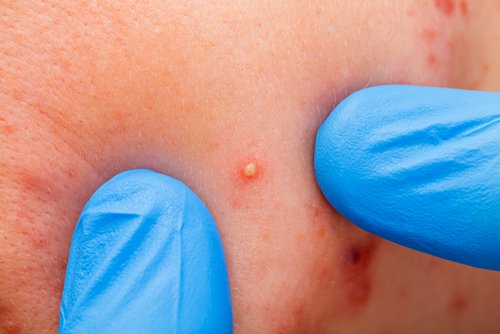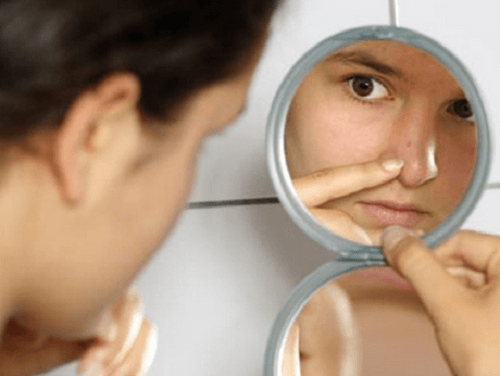Acne Can Reveal Clues About Your Health and Habits

Although acne has different causes and relates to hormonal changes, this problem has also been considered a symptom of various internal health problems. On the other hand, many times, acne can reveal a lack of sufficient skin care or excess oils on the skin.
Discover what acne can reveal about your health below!
First of all, in order to find out what acne can reveal about your health and habits, it’s very important to notice where and when it appears. As it often relates to hormonal changes, it may occur during your menstrual period. On the other hand, your pimples may form when you’re under stress or much tension.
Would you like to know what else acne could be saying about your health?
Acne Can Reveal Clues About Your Health and Habits
-
Acne on the Chin, Edge of the Jaw or Neck

The solution? The best way to treat this type of acne is to apply an anti-acne treatment to the affected areas, preferably before the start of the menstrual period. If the problem becomes chronic, you should consult a dermatologist so that this professional recommends an appropriate treatment.
-
Blackheads or Pimples at the Hairline
This kind of acne can reveal that you may be applying hair products too close to the skin. Otherwise, you may have touched the area often with dirty hands. Because some types of hair products contain ingredients that can clog your pores, they can produce pimples and bumps.
The solution? Reduce the use of these types of products. Besides, be more careful the next time you apply them: when using them, avoid direct contact with skin.
-
Blackheads or Pimples on the Cheeks

In most cases, some form of bacteria or dirt causes them. These bacteria or pollutants can come from your hands or even your phone. The solution? Wash your hands frequently or use some type of anti-bacterial gel to keep them well cleaned.
It’s also important to frequently clean your phone because, believe it or not, studies have shown that it can have more microorganisms than a public toilet.
Check out: Learn How to Make Natural Oatmeal Soap to Exfoliate Your Skin
-
Blackheads or Pimples Around the Mouth
You may be eating a lot of fatty or acidic foods. This type of acne occurs because the remains of acidic foods, such as lemon or vinegar-based dressings, cause irritation. It is also produced by very fatty foods, such as potato chips, French fries, cakes and burgers. These kinds of foods clog your pores, thus triggering acne.
The solution? If possible, you should completely remove all the residue from foods left around your mouth after eating. In order to do this, you should use a damp cloth.
You might like: Fight Acne by Adding These 5 Detox Smoothies to Your Diet
-
Acne in the T Zone

Pimples and blackheads that occur in the T zone (which includes the forehead and nose) may be a result of stress. When we’re under stress or feel a lot of pressure, our body releases adrenaline to increase the production of oil, which in turn causes the formation of bumps, pimples and blackheads.
The solution? Avoid stressful situations and take steps for relaxing.
-
Acne on the Back or Chest
In this case, acne doesn’t reflect something involving our internal health, but it may indicate that we’re using an unsuitable shirt or bra. According to some experts, acne on the back or chest can be produced by the use of cotton fabrics that absorb sweat and create a perfect environment for bacteria growth.
The solution? Avoid the use of very tight shirts and blouses, especially if they are made of cotton. Also, avoid using tight-fitting bras. The recommendation is to use moisture-wicking fabrics such as spandex (lycra) or microfiber.
All cited sources were thoroughly reviewed by our team to ensure their quality, reliability, currency, and validity. The bibliography of this article was considered reliable and of academic or scientific accuracy.
- Lucky, A. W. (2004). Quantitative documentation of a premenstrual flare of facial acne in adult women. Archives of dermatology, 140(4), 423-424. Available at: https://jamanetwork.com/journals/jamadermatology/article-abstract/480456. Accessed 25/03/2020.
- Hui, R. W. (2017). Common misconceptions about acne vulgaris: A review of the literature. Clinical Dermatology Review, 1(2), 33. Available at: http://www.cdriadvlkn.org/article.asp?issn=2542-551X;year=2017;volume=1;issue=2;spage=33;epage=36;aulast=Hui. Accessed 25/03/2020.
- Kannan, S., Khan, W., Bharadwarj, A., Rathore, B. S., & Khosla, P. P. (2015). Corticosteroid-induced cutaneous changes: A cross-sectional study. Indian journal of pharmacology, 47(6), 696. Available at: https://www.ncbi.nlm.nih.gov/pmc/articles/PMC4689033/. Accessed 25/03/2020.
- Tagoe, D. N., Gyande, V. K., & Ansah, E. O. (2011). Bacterial contamination of mobile phones: When your mobile phone could transmit more than just a call. Available at: https://www.webmedcentral.com/article_view/2294. Accessed 25/03/2020.
- Thiboutot, D. (2004). Acne: hormonal concepts and therapy. Clinics in dermatology, 22(5), 419-428. Available at: https://doi.org/10.1016/j.clindermatol.2004.03.010. Accessed 25/03/2020.
- Zouboulis, C. C., & Böhm, M. (2004). Neuroendocrine regulation of sebocytes–a pathogenetic link between stress and acne. Experimental dermatology, 13, 31-35. Available at: https://doi.org/10.1111/j.1600-0625.2004.00254.x. Accessed 25/03/2020.
This text is provided for informational purposes only and does not replace consultation with a professional. If in doubt, consult your specialist.








